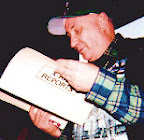
The theme of my recently published book of poems Virtually Incurable, But Not Yet Terminal*, is simple: "It's poetry, don't worry about it." "It's life, don't worry about it." "It's cancer, don't worry about it!" "It's AIDS, don't worry about it!"
One of my doctors, and a few of my friends, are puzzled by my attitude towards cancer. They think I should "worry more about it." I answer: "Doesn't worry cause cancer? Why worry more about it?"
In poem 100, where I make this theme explicit, a typo-or what I call an Omegaism-keeps creeping back into the poem. Where I wrote and originally composed, corrected in proof, the line was to read "It's poetry, don't worry about it." Instead, despite all my efforts and the good care of my publisher and second proof reader, [John] Michael Vore, a typo keeps coming back to make the line read: "It's poetry, don't sorry about it."
My dyslexia occurs at the end of words, not the beginning. I know "sorry" from "worry." I can distinguish S from W.
After seeing the typo, I had to rethink what I wrote. What is the difference between the two simple words SORRY and WORRY? We think we know the difference, but how do they differ in their physical elements, history, or etymology?
“Sorry” comes from the French sar and means "sore," "pain," "grief." It is an ouch. Kiss it and make it go away. An 'ouchy,' a sore, a blotch, a typo on the skin. Like cancer is a sore, and ouch, a blotch or a typo on the skin.
“Worry” is an Old English word from worien and the verb wyrgan, pronounced like you were saying dialogue n the movie Fargo.
What it means in English is hard to get a hold of. We have it, and then we don't have it. That's what we worry about.
We get cancer. Then we don't have it. We are "cancer free." Then, we get it again. That's the kind of thing that makes us worry warts.
In Old English root, the verb "to worry" means "to choke or strangle." When we worry, we sit stewing, inactive, letting the evil inside us build up until we want to reach out and choke or strangle somebody.
When I explained this to Jamie Von Roenn, my primary doctor, she was amazed. "Worry turns to violence." Yes, Self Violence. The pent-up anger builds until you want to reach out and commit a violent act.
I told her a good example of this has been American foreign policy since World War II. Americans sit comfortably home "worried" about the hot spots in the world. The worry builds until we reach out, unpredictably, and bomb a little country or strangle, with an economic blockade, some petty dictator. Our policy is based on worry.
Clinton is a Worry Wart. He's slick until he gets worried about the polls, then he reaches out to strangle someone.
Dole is a Sore Head.
Cancer is a sore.
Dole is a cancer, and Clinton the worry that causes sores, causes ouches all over the world, causes cancer.
No wonder so many hated their choice in the last election between the one who is cancer versus the one who causes cancer.
That's why now I don't worry about it. If a genuine Omega typo appears in one of my printed poems, I'm sorry. Ouch. But I don't worry about it. It's there to teach me/us something.
Had the sorry/worry typo not appeared, I would never have thought about the real difference between them. I may have gone on to worry more about my cancer, instead of treating it like my doctors do, one sore at a time.
[Publisher’s Note(s): This originally appeared in Jon-Henri Damski’s column, “Queer Thoughts & Mini-Essays” in Windy City Times on November 13, 1996.
[*As Jon-Henri used to joke, everything we did had three titles. His first volume of poems, then, has three titles:
(a) Virtually Incurable, But Not Yet Terminal (b) Poems for the Fo(u)rth Quarter and (c) X-Ray Reports; when published in digital form, we used (b): Poems for the Fo(u)rth Quarter.) Jon-Henri can bee seen reading and discussing the ideas in this essay by clicking here.--John Vore]